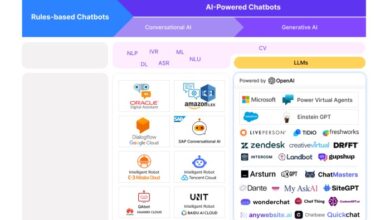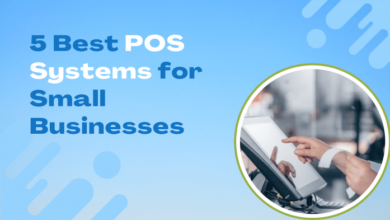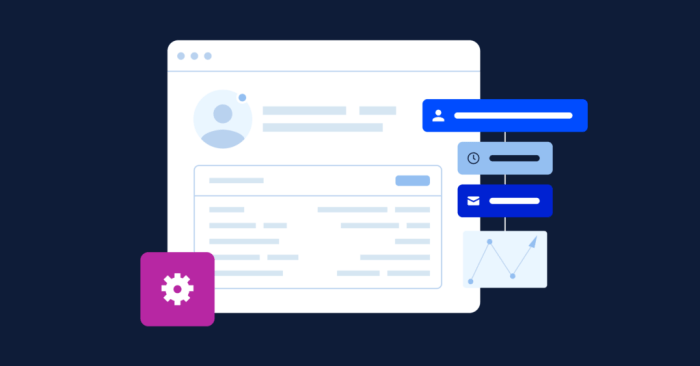
Best AI CRM Software: Boosting Customer Engagement and Sales
Best AI CRM software is revolutionizing the way businesses interact with their customers. Gone are the days of clunky, manual CRM systems; AI-powered solutions are now streamlining processes, automating tasks, and delivering personalized experiences that resonate with modern consumers.
Imagine a CRM system that anticipates your customers’ needs, suggests the most effective sales strategies, and even predicts future trends. This is the power of AI CRM, and it’s transforming industries across the board. From e-commerce to healthcare, businesses are leveraging AI CRM to enhance customer engagement, boost sales, and gain a competitive edge.
Introduction to AI CRM Software
The evolution of customer relationship management (CRM) software has been a fascinating journey, marked by constant innovation and the pursuit of more efficient and personalized customer interactions. From rudimentary systems focused on basic contact management to sophisticated platforms integrating marketing automation and sales pipelines, CRM has evolved significantly.
The emergence of artificial intelligence (AI) has further revolutionized CRM, introducing a new era of intelligent solutions that empower businesses to understand their customers better and deliver exceptional experiences.AI CRM software leverages machine learning algorithms, natural language processing, and predictive analytics to automate tasks, analyze customer data, and provide actionable insights.
This intelligent approach helps businesses to optimize their sales and marketing efforts, improve customer service, and ultimately drive revenue growth.
Benefits of AI CRM Software
AI CRM software offers numerous advantages for businesses across various industries. The key benefits include:
- Personalized Customer Experiences:AI-powered CRM systems can analyze customer data to understand individual preferences, purchase history, and interactions. This allows businesses to tailor their marketing campaigns, product recommendations, and communication to meet specific customer needs, creating personalized experiences that enhance customer satisfaction and loyalty.
- Improved Sales Efficiency:AI algorithms can automate repetitive tasks such as lead scoring, qualification, and nurturing. By identifying high-potential leads and prioritizing sales efforts, AI CRM helps sales teams focus on the most promising opportunities, leading to increased conversion rates and faster sales cycles.
- Enhanced Customer Service:AI-powered chatbots and virtual assistants can handle routine customer inquiries and provide instant support, freeing up human agents to focus on more complex issues. AI can also analyze customer feedback and sentiment, enabling businesses to identify and address customer concerns proactively.
Finding the best AI CRM software can feel like a treasure hunt, but sometimes, the most exciting discoveries come from unexpected places. Just like the recent HomePod 3 leak revealing a major upgrade with a display , the right CRM can revolutionize how you manage your business.
So, while we wait for the new HomePod, let’s keep exploring the potential of AI in the CRM world.
- Data-Driven Insights:AI CRM systems can analyze vast amounts of customer data to uncover hidden patterns and trends. This data-driven insights provide businesses with a deeper understanding of customer behavior, market dynamics, and competitor strategies, enabling them to make informed decisions and optimize their operations.
Real-World Applications of AI CRM
AI CRM is transforming businesses across various industries. Here are some real-world examples:
- E-commerce:AI-powered recommendation engines can analyze customer browsing history and purchase patterns to suggest relevant products, leading to increased sales and customer engagement. For instance, Amazon uses AI to personalize product recommendations for its millions of users, driving significant revenue growth.
- Financial Services:AI CRM systems can help banks and insurance companies detect fraudulent activities, assess customer risk profiles, and provide personalized financial advice. For example, Capital One uses AI to analyze customer data and provide tailored credit offers, leading to improved customer satisfaction and increased loan approvals.
- Healthcare:AI CRM can assist healthcare providers in managing patient records, scheduling appointments, and providing personalized treatment plans. For instance, hospitals can use AI to analyze patient data and identify potential health risks, enabling proactive interventions and improving patient outcomes.
- Hospitality:AI-powered chatbots can handle guest inquiries, provide recommendations for local attractions, and automate check-in and check-out processes. For example, hotels can use AI to personalize guest experiences, offering tailored amenities and services based on individual preferences.
Core Features of AI CRM Software: Best Ai Crm Software
AI-powered CRM systems have become increasingly popular as businesses strive to improve customer relationships and drive revenue growth. These systems leverage advanced technologies, such as machine learning, to automate tasks, gain deeper insights, and deliver personalized experiences. This section will delve into the essential features that distinguish AI CRM software and how they empower businesses to achieve their goals.
Machine Learning Automation
Machine learning plays a crucial role in automating various CRM tasks, enhancing efficiency and freeing up valuable time for more strategic initiatives. By analyzing vast amounts of data, AI algorithms can identify patterns and predict future outcomes, leading to more informed decision-making.
Machine learning algorithms can automate repetitive tasks like data entry, lead qualification, and customer segmentation.
For instance, AI-powered CRM systems can automatically assign leads to the most appropriate sales representatives based on their expertise and the lead’s characteristics. This ensures that leads are handled efficiently and effectively, increasing the chances of conversion.
Lead Scoring and Prioritization
AI CRM software utilizes machine learning algorithms to assess the potential value of each lead. By analyzing various data points, such as website visits, email interactions, and social media activity, AI systems can assign a score to each lead, indicating their likelihood of conversion.
Lead scoring helps sales teams prioritize their efforts, focusing on the leads with the highest potential.
This allows sales teams to allocate their time and resources effectively, maximizing their productivity and achieving better results.
Customer Segmentation and Personalization
AI-powered CRM systems can segment customers based on their behavior, demographics, and preferences. This allows businesses to tailor their marketing messages and offers to specific customer groups, leading to more targeted and effective campaigns.
Customer segmentation enables businesses to deliver personalized experiences that resonate with each customer segment.
For example, an AI CRM system could identify a segment of customers who are highly engaged with the brand’s social media content. The system could then recommend personalized offers and promotions based on their interests, increasing their likelihood of purchase.
Predictive Analytics
AI CRM software can analyze historical data and identify patterns to predict future customer behavior. This enables businesses to anticipate customer needs and proactively address potential issues before they arise.
Predictive analytics helps businesses make data-driven decisions and optimize their strategies for better outcomes.
Finding the best AI CRM software for your business can be a game-changer, streamlining your sales and marketing efforts. But once you’ve chosen your platform, you might find yourself needing to automate tasks or manage data in a more efficient way.
That’s where PowerShell comes in – a powerful scripting language that can handle complex tasks with ease. If you’re looking to maximize your AI CRM’s potential, check out this fantastic resource on powershell the smart persons guide. Mastering PowerShell can give you a significant edge in managing your CRM data and automating processes, ultimately leading to better results.
For example, an AI CRM system could predict which customers are at risk of churn based on their recent activity and engagement levels. This allows businesses to intervene early and implement targeted retention strategies to prevent customer loss.
Benefits of AI CRM for Businesses
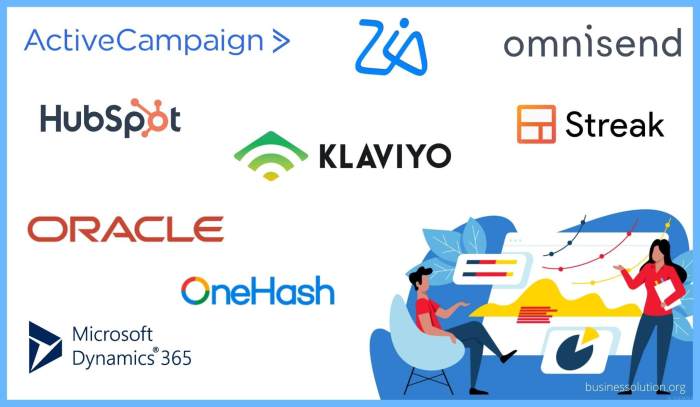
AI CRM software offers a plethora of benefits for businesses across various industries, helping them optimize operations, enhance customer relationships, and drive revenue growth. By leveraging the power of artificial intelligence, AI CRM systems can automate tasks, analyze data, and provide valuable insights, ultimately enabling businesses to achieve their strategic goals.
Enhanced Customer Engagement and Satisfaction
AI CRM plays a crucial role in enhancing customer engagement and satisfaction by providing businesses with a deeper understanding of their customers’ needs and preferences. By analyzing customer data, AI CRM systems can identify patterns and trends, enabling businesses to personalize interactions and provide tailored experiences.
- Proactive Customer Support:AI-powered chatbots can provide instant support to customers, resolving queries and addressing issues in real-time, enhancing customer satisfaction and reducing wait times. For example, a customer service chatbot can answer frequently asked questions, provide product information, or escalate complex issues to human agents.
- Personalized Recommendations:AI CRM can analyze customer purchase history, browsing behavior, and other data to provide personalized product recommendations, increasing the likelihood of sales and fostering customer loyalty. For instance, an online retailer can use AI CRM to suggest products that customers are likely to be interested in based on their past purchases and browsing activity.
- Targeted Marketing Campaigns:AI CRM enables businesses to segment their customer base and tailor marketing campaigns to specific groups, increasing campaign effectiveness and maximizing ROI. For example, a travel agency can use AI CRM to target customers with personalized travel deals based on their travel preferences, destinations, and budget.
Increased Sales Productivity and Revenue Growth, Best ai crm software
AI CRM can significantly boost sales productivity and drive revenue growth by automating tasks, providing actionable insights, and optimizing sales processes.
- Lead Scoring and Prioritization:AI CRM can automatically score leads based on their likelihood of conversion, allowing sales teams to prioritize their efforts and focus on the most promising opportunities. This ensures that sales representatives spend their time on leads that are most likely to result in sales, leading to increased productivity and revenue.
- Sales Forecasting and Pipeline Management:AI CRM can analyze historical data and current trends to provide accurate sales forecasts, enabling businesses to make informed decisions about resource allocation and sales strategies. It can also automate pipeline management tasks, such as tracking opportunities, managing follow-ups, and sending reminders, freeing up sales representatives to focus on closing deals.
- Improved Sales Effectiveness:AI CRM can provide sales representatives with insights into customer behavior, buying patterns, and preferred communication channels, enabling them to tailor their approach and increase their chances of closing deals. For example, AI CRM can analyze a customer’s past interactions with the company and suggest the best time and channel to reach out to them.
Optimized Marketing Campaigns and Personalized Customer Experiences
AI CRM can revolutionize marketing efforts by providing businesses with the ability to personalize customer experiences and optimize marketing campaigns for maximum impact.
- Customer Segmentation and Targeting:AI CRM enables businesses to segment their customer base into distinct groups based on demographics, behavior, and other criteria. This allows marketers to tailor their messaging and campaigns to specific segments, increasing the likelihood of engagement and conversion.
- Automated Marketing Tasks:AI CRM can automate various marketing tasks, such as email marketing, social media posting, and content creation, freeing up marketers to focus on strategic initiatives. For example, AI CRM can automate email campaigns based on customer behavior, sending personalized messages to customers based on their interests and preferences.
- Real-time Customer Insights:AI CRM provides marketers with real-time insights into customer behavior, allowing them to adjust their campaigns on the fly and optimize their performance. For example, if a marketer sees that a particular campaign is not performing well, they can use AI CRM to analyze the data and identify the reasons for the low engagement, enabling them to make adjustments to improve the campaign’s effectiveness.
Top AI CRM Software Solutions
Now that we’ve explored the benefits and features of AI CRM software, let’s delve into some of the leading solutions available in the market. Each platform offers a unique set of capabilities and caters to different business needs.
Top AI CRM Software Providers
Here’s a comparison table highlighting key features, pricing, and user reviews for some of the top AI CRM software providers:
| Software Name | Key Features | Pricing | User Reviews |
|---|---|---|---|
| Salesforce Einstein | Predictive lead scoring, automated insights, personalized recommendations, AI-powered chatbots | Starts at $25 per user/month | 4.5/5 stars on G2 |
| Microsoft Dynamics 365 AI | AI-driven insights, predictive analytics, automated workflows, personalized customer experiences | Starts at $65 per user/month | 4.3/5 stars on G2 |
| HubSpot CRM | AI-powered lead qualification, conversational bots, automated email marketing, predictive analytics | Free plan available, paid plans start at $450 per month | 4.4/5 stars on G2 |
| Zoho CRM | AI-powered sales forecasting, intelligent automation, predictive lead scoring, personalized recommendations | Starts at $14 per user/month | 4.2/5 stars on G2 |
Let’s take a closer look at each solution:
Salesforce Einsteinis a comprehensive AI CRM platform known for its robust features and scalability. It excels in providing AI-driven insights, automating tasks, and personalizing customer experiences. However, its pricing can be a barrier for smaller businesses.
Microsoft Dynamics 365 AIis another powerful AI CRM solution that integrates seamlessly with Microsoft’s suite of productivity tools. It offers a strong focus on data analysis, predictive modeling, and intelligent automation. The platform is well-suited for businesses with complex workflows and a need for advanced analytics.
Finding the best AI CRM software can be a game-changer for any business, but it’s especially crucial for industries with complex workflows like property management. If you’re looking for a solution that can streamline your operations, automate tasks, and provide valuable insights, consider exploring the best property management CRM options available, like those featured in this comprehensive guide: best property management CRM.
By leveraging AI-powered CRM solutions, you can significantly enhance your property management processes and gain a competitive edge in the market.
HubSpot CRMis a popular choice for small and medium-sized businesses. It offers a user-friendly interface, a free plan, and a wide range of AI-powered features, including lead qualification, conversational bots, and automated marketing. HubSpot’s focus on ease of use makes it a good option for companies looking to get started with AI CRM.
Zoho CRMis a comprehensive CRM platform that offers a wide range of AI-powered features at a competitive price. It provides intelligent automation, predictive lead scoring, and personalized recommendations. Zoho CRM is a good option for businesses seeking a balance between functionality and affordability.
Choosing the Right AI CRM Software
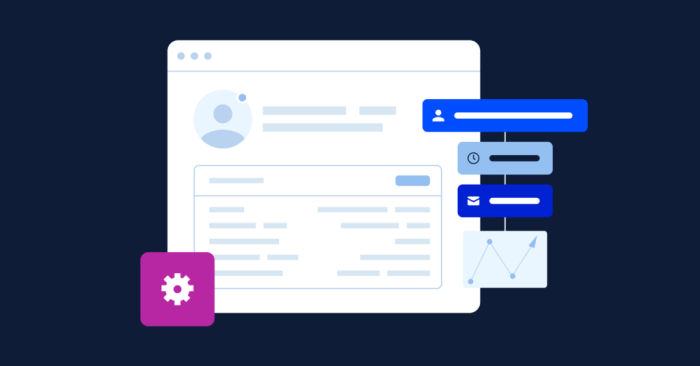
Selecting the perfect AI CRM software is a crucial step for any business looking to leverage the power of artificial intelligence to enhance customer relationships and drive growth. The right AI CRM solution can streamline operations, personalize interactions, and unlock valuable insights, but choosing the wrong one can lead to wasted resources and frustration.
Factors to Consider When Selecting AI CRM Software
Before diving into specific AI CRM solutions, it’s essential to have a clear understanding of your business needs and priorities. Here are some key factors to consider:
- Business Size and Industry: Different AI CRM solutions cater to businesses of varying sizes and industries. Consider the specific needs of your industry and the scale of your operations. For example, a small business might need a solution with simpler features and a user-friendly interface, while a large enterprise might require more robust functionality and integration capabilities.
- Budget: AI CRM solutions come with a range of pricing models, from subscription-based plans to one-time purchases. Determine your budget and prioritize features that align with your financial constraints.
- Existing Systems and Integrations: The ability to seamlessly integrate with your existing business systems is crucial. Consider how the AI CRM solution will connect with your current CRM, marketing automation tools, email platforms, and other essential software.
- Features and Functionality: Evaluate the features and functionalities offered by different AI CRM solutions. Consider your specific needs, such as lead scoring, customer segmentation, personalized communication, predictive analytics, and automation capabilities.
- Data Security and Privacy: Data security and privacy are paramount, especially when dealing with sensitive customer information. Ensure the AI CRM solution adheres to industry best practices and complies with relevant regulations.
- Customer Support: Choose an AI CRM solution with responsive and reliable customer support. You’ll need assistance during the implementation and ongoing use of the software.
Evaluating Different AI CRM Solutions
Once you’ve identified your key considerations, you can start evaluating different AI CRM solutions. A structured approach will help you make an informed decision.
- Define Your Requirements: Start by clearly defining your business objectives and specific requirements for an AI CRM solution. What problems are you trying to solve? What features are essential? What are your budget constraints?
- Research and Compare: Explore different AI CRM solutions available in the market. Read reviews, compare features, and consider the reputation of the vendors. Many software review platforms and industry publications offer valuable insights and comparisons.
- Request Demos and Trials: Most AI CRM vendors offer free trials or demonstrations. Take advantage of these opportunities to test the software, explore its features, and assess its usability.
- Consider Integration: Evaluate the ease of integration with your existing systems and workflows. Ensure seamless data transfer and communication between the AI CRM solution and your other software applications.
- Assess Data Security and Privacy: Verify the vendor’s data security and privacy practices. Review their policies, certifications, and compliance with relevant regulations.
- Evaluate Customer Support: Contact the vendor’s customer support team to assess their responsiveness and helpfulness. Ask about their support channels, response times, and availability.
- Get Feedback from Other Users: Reach out to other businesses that have implemented the AI CRM solution. Gather their feedback on the software’s effectiveness, usability, and customer support.
Integrating AI CRM with Existing Business Systems
Integrating AI CRM with your existing business systems is crucial for maximizing its benefits. Seamless integration ensures data consistency, reduces manual work, and enables efficient workflows.
“Integration is key to unlocking the full potential of AI CRM. By connecting your CRM with other business systems, you can create a unified platform for managing customer interactions and gaining valuable insights.”
- Data Synchronization: Ensure that data is synchronized between the AI CRM solution and your other systems. This eliminates data silos and ensures a consistent view of your customer information.
- Automated Workflows: Integrate AI CRM with your marketing automation tools, email platforms, and other software to create automated workflows. This can streamline processes such as lead nurturing, customer onboarding, and support requests.
- Real-Time Insights: Integration allows you to access real-time insights from your AI CRM solution within your existing business systems. This enables you to make data-driven decisions and optimize your customer interactions.
Future of AI CRM
The rapid evolution of AI is transforming CRM software, promising to redefine how businesses interact with their customers. As AI technologies continue to advance, CRM systems will become even more sophisticated, intelligent, and personalized, leading to a more efficient and engaging customer experience.
AI-Powered Personalization
AI will play a crucial role in creating personalized experiences for customers. By analyzing vast amounts of data, AI algorithms can identify individual customer preferences, purchase history, and engagement patterns. This information can be used to tailor marketing campaigns, product recommendations, and customer support interactions to each customer’s unique needs.
For example, AI-powered chatbots can provide personalized responses to customer inquiries, while AI-driven email marketing can deliver targeted offers based on customer behavior.
Predictive Analytics and Forecasting
AI-powered predictive analytics will enable businesses to anticipate customer needs and behaviors. By analyzing historical data, AI algorithms can identify patterns and trends that can be used to predict future customer actions. This information can be used to optimize marketing campaigns, forecast sales, and proactively address customer issues before they arise.
For instance, an AI-powered CRM system can predict which customers are likely to churn and suggest targeted interventions to retain them.
Automation and Efficiency
AI will automate repetitive tasks, freeing up human resources to focus on more strategic activities. AI-powered CRM systems can automate tasks such as data entry, lead qualification, and customer segmentation. This automation will streamline business processes, improve efficiency, and reduce costs.
For example, AI-powered chatbots can handle basic customer support inquiries, allowing human agents to focus on more complex issues.
Enhanced Customer Service
AI will enhance customer service by providing faster, more efficient, and personalized support. AI-powered chatbots can provide instant responses to customer inquiries, while AI-driven sentiment analysis can identify customer emotions and tailor responses accordingly. AI can also be used to personalize customer service interactions, providing each customer with a tailored experience.
The Rise of Conversational AI
Conversational AI is becoming increasingly popular in CRM systems. AI-powered chatbots and virtual assistants are used to engage with customers, answer questions, and provide support. Conversational AI can be used to enhance customer service, gather customer feedback, and even drive sales.
For example, AI-powered chatbots can be used to qualify leads, schedule appointments, and even process orders.
The Future of AI CRM
The future of AI CRM is bright. As AI technologies continue to evolve, CRM systems will become even more intelligent, personalized, and efficient. Businesses will be able to leverage AI to gain deeper insights into their customers, automate tasks, and provide a more personalized and engaging customer experience.
AI will be a key driver of customer-centricity, helping businesses to build stronger relationships with their customers and drive growth.


